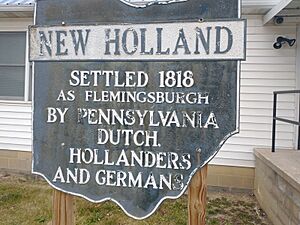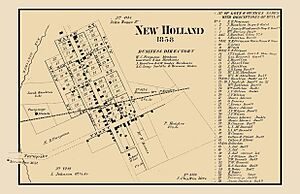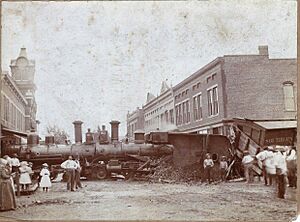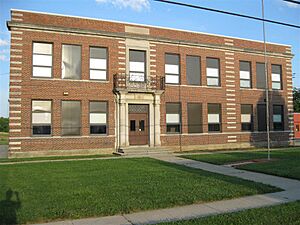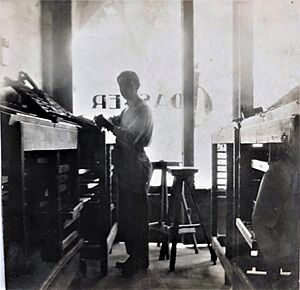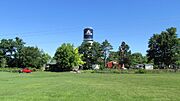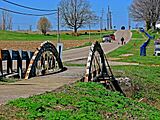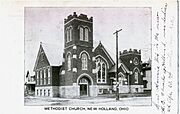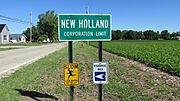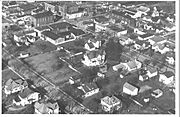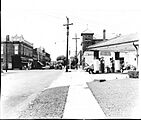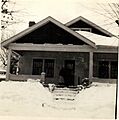New Holland, Ohio facts for kids
Quick facts for kids
New Holland, Ohio
|
|
|---|---|
|
Village
|
|
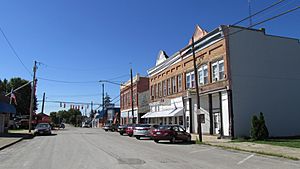
Looking south on North Main Street in New Holland
|
|
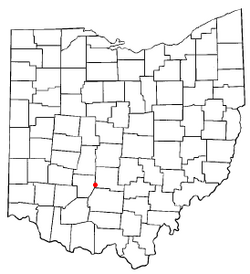
Location of New Holland, Ohio
|
|
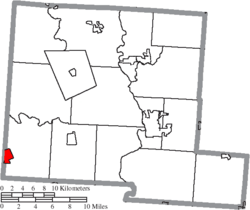
Location of New Holland in Pickaway County
|
|
| Country | United States |
| State | Ohio |
| Counties | Pickaway, Fayette |
| Area | |
| • Total | 1.96 sq mi (5.07 km2) |
| • Land | 1.96 sq mi (5.07 km2) |
| • Water | 0.00 sq mi (0.00 km2) |
| Elevation | 853 ft (260 m) |
| Population
(2020)
|
|
| • Total | 804 |
| • Density | 410.62/sq mi (158.55/km2) |
| Time zone | UTC-5 (Eastern (EST)) |
| • Summer (DST) | UTC-4 (EDT) |
| ZIP code |
43145
|
| Area code(s) | 740 |
| FIPS code | 39-54726 |
| GNIS feature ID | 2399466 |
New Holland is a small village located in Ohio, United States. It is found in both Fayette and Pickaway counties. In 2020, about 804 people lived there.
The part of New Holland in Pickaway County is close to Columbus. This means it's part of a larger area where many people live and work. The part in Fayette County is closer to Washington Court House.
Contents
The Story Behind the Name
New Holland wasn't always called that! It was first named Flemingsburgh on September 2, 1818. It got its name from John Fleming. He was the son of Captain Fleming, who settled in the area in 1802.
Later, between 1818 and 1827, the name was changed to New Holland. This new name was chosen because many of the first settlers came from Holland. They wanted to honor their home country.
A Look Back: New Holland's History
In 1818, early settlers arrived in the area. Many of them were from Pennsylvania Dutch, Holland, and Germans. They settled on a piece of land called "Four Corners." This land was given to Wilkins Ogden in 1802.
It was called "Four Corners" because it was a meeting point. A stagecoach line ran east and west, and a Native American trail went north and south. Today, this busy crossing is where Main Street and Front Street meet.
The settlement grew quickly. Its first name, Flemingsburgh, honored John Fleming. He was an early settler who arrived in 1802. Around 1825, the people wanted to get a Post Office. Since many settlers were from Holland, they decided to rename their home New Holland. This name has stayed ever since.
In the early days, most houses were simple log cabins. There were only a few places to buy and sell goods. New Holland officially became a village in 1834.
One exciting event happened after the Civil War. A part of General Sherman's Union Army marched through New Holland. They crossed a covered bridge on Zanesville Cincinnati Trace (U.S. Route 22). This bridge was built in 1840 and lasted until 1943. Some people thought the bridge was moved to the Henry Ford Museum. However, its parts were actually used as scrap wood.
The Great Train Wreck of 1899
On the evening of September 18, 1899, something dramatic happened. Two trains crashed head-on right in the middle of New Holland! This happened at the railroad crossing on North Main Street.
Eastbound Engine 813 was moving very fast. Its engineer, Charles Ditto, didn't know that the train's caboose and some cars had broken off. This happened a little west of New Holland. As Engine 813 got closer to the village, Mr. Ditto saw Engine 801 coming towards him. He blew the train's whistle to tell the brakeman to slow down. But he still didn't know the caboose was gone!
When he realized what happened, Ditto quickly put his train in reverse. But it was too late. The engineer of Engine 801, Joe Todhunter, had also seen the approaching train. To save his train and its cargo, he uncoupled his engine and three cars. He sent them forward to meet the other train.
People who saw it said the crash was so loud it could be heard for miles! Both engines flew high into the air and then crashed down. Engine 801, which was newer, was badly damaged. One of its cars was completely destroyed. Engine 813 was totally wrecked. Its tender (the car carrying fuel) was overturned. Seven of its cars were smashed, with most thrown across the tracks. One car was even forced over another after its wheels broke off. Another box car broke into pieces. About half of it crashed into the back of the Gooley Brother's Implement Store.
Luckily, no one was hurt in the crash. Both engineers and firemen jumped to safety just before the trains hit. The damage from the crash was about $10,000. That would be around $373,891 today! It took workers from 10 p.m. that night until the next morning to clean up all the mess.
Where is New Holland?
New Holland covers an area of about 1.88 square miles (4.87 square kilometers). All of this area is land.
How Many People Live Here?
| Historical population | |||
|---|---|---|---|
| Census | Pop. | %± | |
| 1870 | 326 | — | |
| 1880 | 478 | 46.6% | |
| 1890 | 683 | 42.9% | |
| 1900 | 824 | 20.6% | |
| 1910 | 804 | −2.4% | |
| 1920 | 810 | 0.7% | |
| 1930 | 741 | −8.5% | |
| 1940 | 777 | 4.9% | |
| 1950 | 799 | 2.8% | |
| 1960 | 798 | −0.1% | |
| 1970 | 796 | −0.3% | |
| 1980 | 783 | −1.6% | |
| 1990 | 841 | 7.4% | |
| 2000 | 785 | −6.7% | |
| 2010 | 801 | 2.0% | |
| 2020 | 804 | 0.4% | |
| U.S. Decennial Census | |||
In 2010, there were 801 people living in New Holland. These people lived in 308 homes, and 212 of those were families. The village had about 426 people per square mile.
Most of the people living in New Holland are White (97.6%). A small number are from other racial backgrounds. About 1% of the population identified as Hispanic or Latino.
The average age of people in the village was 41.2 years. About 22.7% of residents were under 18 years old. About 14.5% were 65 years or older. The population was almost evenly split between males (50.4%) and females (49.6%).
Famous Faces from New Holland
- Terry Lyons was a baseball player who came from New Holland.
Schools in New Holland
Today, children living in New Holland go to schools in the Miami Trace Local School District. However, New Holland used to have its own high school. New Holland High School opened in 1887. The last class graduated on May 27, 1959.
News from New Holland
Local Newspapers
The New Holland Review was a newspaper published from 1877 to 1879.
The New Holland Leader was the community's main newspaper for 93 years! It started in 1887 as Plain Talk. The name New Holland Leader wasn't used until 1900. The Leader was a weekly newspaper, published every Thursday. It shared news and events from the town. You could find news about births, marriages, and deaths. It also covered social events and updates from schools and churches.
E.B. Lewis was the first person to publish the newspaper. Here are some other publishers over the years:
| Years | Name |
|---|---|
| 1905-1921 | Percy May |
| 1921-1947 | Wendell Turner |
| 1947 | Earl Hinkle |
| 1947-1965 | Lawrence Hunter |
| 1965-1972 | Charles Mallory |
| 1972-1981 | Greenfield Times |
For many years, the Leader was printed in the back of the old post office. This was located at 105 North Main Street. In March 1965, the Leader office moved across the street. It stayed there until Charles Mallory sold the paper to the Greenfield Times. In January 1973, the Leader office moved again. It went to 212 West Front Street, to the home of Mrs. Pat Funk. Mrs. Funk wrote for the paper. The New Holland Leader stopped being published on January 1, 1981.
Images for kids
See also
 In Spanish: New Holland (Ohio) para niños
In Spanish: New Holland (Ohio) para niños


